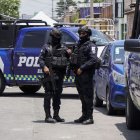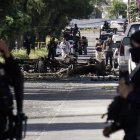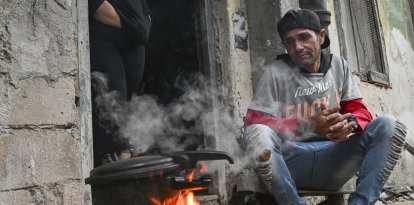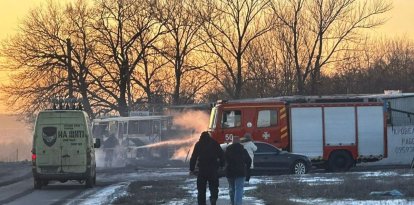Mexico at the top of global violence, with thousands of homicides and the threat of organized crime
The Latin American country faces a bleak outlook, marked by the growing control of cartels and an insufficient government response.

Members of Mexico's National Guard stand guard at a crime scene.
The six-year term of Andrés Manuel López Obrador (2018-2024) culminated with historic figures that position Mexico as the most violent country in the world outside of an official armed conflict, according to data from international and national agencies, with a worrying projection that this trend will continue to rise.
With 200,000 intentional homicides and 51,000 missing persons, the outgoing government left an alarming balance that places Mexico in the bloodiest period of its modern history. As 2025 begins, experts warn that this trend could intensify if immediate and effective measures are not taken to contain the violence.
Extreme violence without civil war
The Conflict Index 2024, prepared by the global Armed Conflict Location and Data (Acled) initiative, states that Mexico is in a period of "continuous violence" comparable to nations in civil war or warlike confrontations. This year, the country was ranked as the fourth most dangerous and violent in the world, only surpassed by Palestine, Myanmar and Syria, three nations facing internal armed conflicts or external wars.
Regionally, Mexico tops the list of the most dangerous countries in Latin America, followed by Haiti, Brazil, Colombia, Honduras and Venezuela.
Acled describes the situation in Mexico as "extreme" and "consistently worrying." According to the report, the country is experiencing a "cartel civil war," in which organized crime has extended its control over vast regions of territory, limiting the state's ability to exercise effective rule. "The government has the power, but not the control," the analysis stresses.
These conflicts are not only limited to narco-trafficking but also encompass activities such as extortion, human trafficking and fuel theft. This diversification of criminal activities has increased competition for illicit markets, exacerbating the fragmentation of criminal groups and fostering a struggle for territorial control.

Society
Texas: Border Patrol finds clandestine tunnel in El Paso used for human trafficking
Verónica Silveri Pazos
An electoral process marked by violence
Violence also had a significant impact on the 2024 elections, with 8,110 political crimes recorded, including murders, threats and assaults targeting candidates and officials. Criminal groups attempted to influence the elections through acts of intimidation, seeking to maintain their interests in key areas of the country.
Despite this insecurity, voters elected Claudia Sheinbaum as the new president. In her inauguration speech, she reiterated her commitment to continuing her predecessor's militarized security strategy. However, experts and public figures have harshly criticized this continuity, questioning its effectiveness in the face of the growing deterioration of public security.
Violence in the first months of Sheinbaum's administration
According to figures reported by journalist Pascal Beltrán del Río, in the first 105 days of Claudia Sheinbaum's six-year term, a total of 8,054 homicides have been recorded. This alarming number underscores the persistent security crisis that the new government faces despite the continuity of the militarized security strategy implemented by its predecessor.
Emblematic cases of violence under the new administration
During the first months of his administration, several high-profile murders have called into question the authorities' ability to contain violence. Among the most prominent cases are the assassination of Alejandro Arcos, mayor of Chilpancingo, Guerrero, in an armed attack on December 2, 2024; the homicide of Benito Aguas, federal deputy of the Green Party in Veracruz, on November 28, 2024; and the assassination of Edmundo Román Pinzón, president of the Superior Court of Justice of Guerrero, on November 17, 2024. These cases reflect the vulnerability of public figures in a context of widespread impunity.
Disturbing projections for 2025
The organization Acled anticipates an increase in the levels of violence during 2025. The first days of the year have already shown alarming figures: 322 homicides were recorded just in the first five days of January.
Adding to this scenario is an increase in cases of domestic violence, according to local reports. Economic pressure on households, exacerbated by inflation and lack of employment, has contributed to increased internal tensions, further affecting social security in the country.
Criticism of security management
Analysts and journalists have pointed out that the continuity of the militarized strategy seems insufficient to face the magnitude of the problem. Instead of decreasing, violence has continued to increase, which has generated distrust in the government's ability to implement effective solutions. A Human Rights Watch article from 2022 stressed that "nearly two decades of military intervention in public security have failed to end the relentless violence of Mexican cartels and have led to countless atrocities committed by soldiers and marines, with almost total impunity."
Uncertain future
The outlook for 2025 is worrying. The organization Acled predicts an increase in violence levels this year, backed by data from the first five days of January showing an alarming trend. The situation seems to indicate that the country will continue to face serious security challenges, and the effectiveness of policies to combat violence is uncertain in the near future.



























